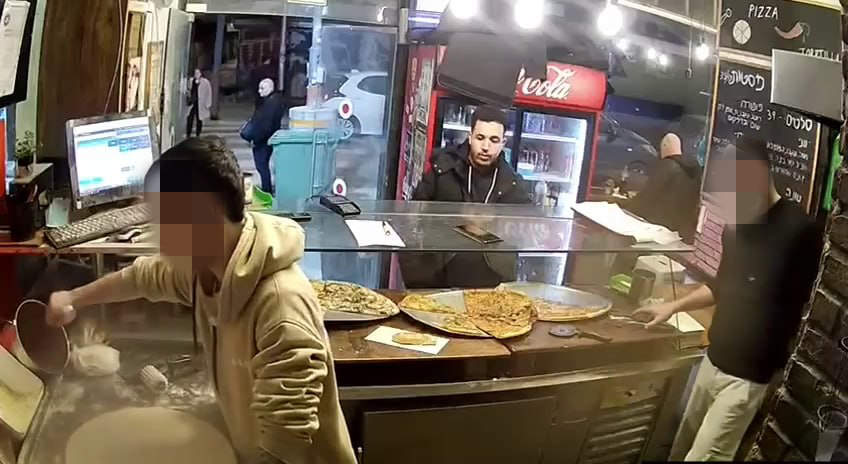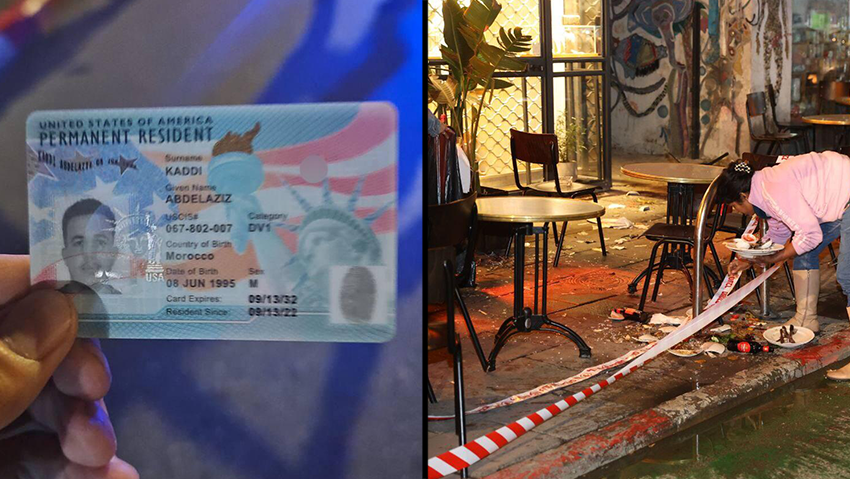Less than a day after the stabbing attack in Tel Aviv, new details have emerged about how the attacker, a 29-year-old Moroccan citizen with a U.S. Green Card, managed to enter Israel. These revelations raise serious concerns about what appears to be a major security lapse.
Despite being flagged and initially denied entry by a border control officer at Ben Gurion Airport, the attacker was ultimately approved by Shin Bet after undergoing questioning and a security screening at the Israeli consulate in New York.
The terrorist buying Pizza minutes before attack
The attacker, Kaddi Abdelaziz, carried out a stabbing spree in Tel Aviv's bustling Nahalat Binyamin area, crowded with nightlife-goers as usual. Five people were injured in the attack—one seriously, one moderately and three lightly.
The attacker was neutralized by soldiers from the elite Sayeret Matkal unit, who responded to the screams of one of the victims, an American tourist. Surveillance footage captured Abdelaziz buying pizza on Allenby Street just moments before launching his attack, three days after arriving in Israel on January 18.
Haim, owner of the pizzeria, recounted his encounter with the attacker: "He bought two slices for himself, grabbed a drink, and left. Then he returned to bring back the plate—which Israelis never do—and was very polite. He said, 'Thanks,' and walked off. When he ordered the pizza, he spoke English with an Arabic accent. He had an Arab appearance but spoke English. My employee and I thought he seemed strange. This was at 8:30 PM, and just a few minutes later, the attack happened. When I heard the screams, I didn’t connect it at first. Later that night, I saw his picture on the news. It was exactly what he had been wearing—and how he looked. I was in shock. I immediately called my employee, and neither of us could believe it."
It soon became clear that a series of missteps had allowed him to enter the country. Upon his arrival in Israel on a connecting flight from Poland, a border control officer at Ben Gurion Airport grew suspicious and refused to approve his entry. Her concerns were based on his inability to provide a convincing answer about where he intended to stay during his visit and the fact that he was carrying little money. A police officer on the scene also noted his "tense body language" as suspicious.
The attacker was referred to Shin Bet for further questioning, but after their interrogation, they determined there were no security grounds to deny him entry. Shin Bet has since announced that the incident will be thoroughly investigated.
The attack as it unfolded
(Video: Line in the Kerem)
"Upon his entry into Israel, a security evaluation was conducted, including both questioning and additional checks, and it was determined there was no basis to deny his entry on security grounds. This case will be reviewed," Shin Bet said.
However, warning signs may have been apparent even earlier. Before flying to Israel, the attacker had visited the Israeli consulate in New York with his Moroccan passport to apply for a tourist visa. He made several visits to the consulate and was asked to provide various documents.
According to sources familiar with the visa process, the purpose of the consular review was to ensure that he did not intend to settle in Israel illegally. At the request of the consulate, he provided documentation proving he was a successful Uber driver with a five-star rating and nearly 3,000 completed rides. He also showed bank statements reflecting a balance of over $10,000, demonstrating financial stability. Additionally, his possession of a U.S. Green Card suggested he intended to return to the United States to continue his naturalization process.
As a Moroccan citizen, his visa application was forwarded to Shin Bet for review, following standard protocol. Shin Bet approved the application within two days—a notably quick response. Based on this approval, the consulate issued his visa. Sources familiar with the process maintain that there were no irregularities in the consulate’s handling of the case or in the conduct of the Foreign Ministry.
Nevertheless, key questions remain unanswered—chief among them, whether anyone had reviewed his Facebook profile. A cursory glance at the page, which was deleted immediately after the attack and his identification, would have revealed posts that were overtly anti-Israel and supportive of Gaza.
In the posts, the attacker accused Israel of "starving northern Gaza" and claimed that "half a million Gazans face death by starvation." He shared a video praising Islam with the caption "Free Palestine" and an image of Ibrahim al-Nabulsi, a terrorist killed in Nablus in 2022. Following the October 7 massacre, he posted, "What is happening now may double the number of martyrs for Islam."
Security officials involved in the visa process argue that reviewing his Facebook page falls squarely under Shin Bet’s purview. Consular officials, they claim, are neither authorized nor trained to evaluate security threats or incitement on social media. "The consulate has no authority over security matters. Their role is to assess whether the individual has a stable economic life to return to and does not intend to settle illegally. Security checks are the responsibility of Shin Bet," said one official.
Kaddi Abdelaziz lived in Brooklyn, and his U.S. ID indicated he was born in Morocco. In a Facebook post from September 14, 2022, he uploaded a photo of himself flying from New York, captioning it, "Alhamdulillah."
Get the Ynetnews app on your smartphone: Google Play: https://bit.ly/4eJ37pE | Apple App Store: https://bit.ly/3ZL7iNv
Another pressing question is why, despite the suspicions raised by the border control officer, the Shin Bet ultimately allowed his entry after the interrogation at Ben Gurion Airport. It is important to clarify that this was not a case of the Shin Bet overriding a border control decision to deny entry. Shin Bet is not authorized to approve entry—it can only recommend denial based on security concerns. In this instance, the border control officer flagged the individual for further review, and Shin Bet conducted its checks, concluding there were no grounds to deny his entry. The incident is now under investigation. Preventing entry to Israel requires concrete evidence or clear indications of malicious intent, neither of which were apparent in this case.
A senior security official highlighted the challenges of screening the large number of foreign arrivals to Israel: "Tens of thousands enter Israel each week, over a million annually. Of these, tens of thousands undergo detailed Shin Bet screenings, and hundreds are denied entry each year. Wartime protocols have tightened screenings significantly, leading to a rise in denials. These decisions often lead to legal appeals, and in rare cases, the decisions are overturned."
Former senior Shin Bet official Dvir Kariv acknowledged the agency’s limitations: "Shin Bet is not infallible—it learns and investigates thoroughly, but mistakes do happen. While it prevents the majority of threats, it is not a machine with a 100% success rate." Speaking about the interrogation at Ben Gurion Airport, he added, "I’ve conducted hundreds, maybe thousands, of interrogations in my career. Only three times did I recommend denial based on a gut feeling that I was dealing with someone problematic. It’s possible the officer here simply misjudged this time."
Adv. Tomer Warsha, head of the Immigration Committee of the Israel Bar Association, criticized the handling of the case. "This serious incident raises heavy questions about the performance of both border control and the Foreign Ministry. Despite clear signs of suspicion, the attacker was allowed entry with a Moroccan passport and a pre-issued visa. This was a case where denial should have been unequivocal, based on existing protocols," he said.
Shin Bet reiterated: "Upon his entry into Israel, a security evaluation was conducted, including questioning and additional checks. It was determined there was no security basis to deny his entry. The case will be thoroughly investigated."





